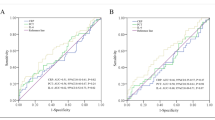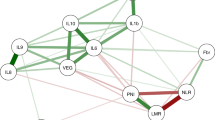Abstarct
Background: Interleukin-6 (IL-6) is an important proinflammatory cytokine that has multiple effects on stimulating inflammation and cell growth. Experimental data suggest that carcinoembryonic antigen (CEA) induces the systemic production of IL-6 and that IL-6 may stimulate tumor cell growth at metastatic sites. We tested the hypothesis that blood concentrations of IL-6 are associated with the amount of circulating CEA and with prognosis in patients with colorectal cancer.
Methods: CEA and IL-6 concentrations were measured by using enzyme immunoassay in preoperative serum samples from 208 patients with stages I through IV colorectal cancer.
Results: Linear regression analysis showed a significant association between serum values of CEA and IL-6 (r = .544; R2 = .296; P < .001). Patients with stage III and stage IV disease had a significantly higher IL-6 serum concentration than those with stage I and stage II disease. In patients with stages I through III, 5-year survival was 83% in cases with concentrations of IL-6 at 10 pg/ml or less (n = 94) and 56% in cases with IL-6 concentrations of more than 10 pg/ml (n = 54; P = .001; median follow-up time, 46 months). By using multivariate analysis, an IL-6 concentration of more than 10 pg/ml was an independent prognostic factor of survival (relative risk = 1.820; P = .020).
Conclusions: In patients with colorectal cancer, blood concentration of IL-6 is associated with high circulating CEA and advanced stage. Furthermore, an IL-6 concentration of more than 10 pg/ml is an independent negative prognostic marker of survival.
Similar content being viewed by others
References
Gold P, Freeman SO. Demonstration of tumor specific antigen in human colonic carcinomata by immunological tolerance and absorption techniques. J Exp Med 1965;121:439–446.
Thomas P, Toth CA, Saini KS, Jessup JM, Steele GD. The structure, metabolism and function of the carcinoembryonic antigen gene family. Biochim Biophys Acta 1990;1032:177–189.
Chapman MA, Buckley D, Hensen DB, Armitage NC. Preoperative carcinoembryonic antigen is related to tumour stage and longterm survival in colorectal cancer. Br J Cancer 1998;78:1346–1349.
Harrison LE, Guillem JG, Paty P, Cohen AM. Preoperative carcinoembryonic antigen predicts outcomes in node-negative colon cancer patients: a multivariate analysis of 572 patients. J Am Coll Surg 1997;185:55–59.
Moertel CG, Fleming TR, Macdonald JS, Haller DG, Laurie JA, Tangen C. An evaluation of the carcinoembryonic antigen (CEA) test for monitoring patients with resected colon cancer. JAMA 1993;270:943–947.
Thompson JA. Molecular cloning and expression of carcinoembryonic antigen gene family members. Tumor Biol 1995;16:10–16.
Thomas P, Gangopadhyay A, Steele G, et al. The effect of transfection of the CEA gene on the metastatic behavior of the human colorectal cancer cell line MIP-101. Cancer Lett 1995;92:59–66.
Hashino J, Fukuda Y, Oikawa S, Nakazato H, Nakanishi T. Metastatic potential of human colorectal carcinoma SW1222 cells transfected with cDNA encoding carcinoembryonic antigen. Clin Exp Metastasis 1994;12:324–328.
Ishii S, Steele G, Ford R, et al. Normal colonic epithelium adheres to carcinoembryonic antigen and type IV collagen. Gastroenterology 1994;106:1242–1250.
Jessup JM, Petrick AT, Toth CA, et al. Carcinoembryonic antigen: enhancement of liver colonisation through retention of human colorectal carcinoma cells. Br J Cancer 1993;67:464–740.
Gangopadhyay A, Bajenova O, Kelly TM, Thomas P. Carcinoembryonic antigen induces cytokine expression in Kupffer cells: implications for hepatic metastasis from colorectal cancer. Cancer Res 1996;56:4805–4810.
Edmiston KH, Gangopadhyay A, Shoji Y, Nachman AP, Thomas P, Jessup JM. In vivo induction of murine cytokine production by carcinoembryonic antigen. Cancer Res 1997;57:4432–4436.
Natali P, Nicotra MR, Cavaliere R, et al. Differential expression of intercellular adhesion molecule1 in primary and metastatic melanoma lesions. Cancer Res 1990;50:1271–1278.
Tsujisaki M, Imai K, Hirata H, et al. Detection of circulating adhesion molecule-1 antigen in malignant disease. Clin Exp Immunol 1991;85:3–8.
Takada A, Ohmori K, Yoneda T, et al. Contribution of carbohydrate antigens sialyl Lewis X to adhesion of human cancer cells to vascular endothelium. Cancer Res 1993;53:354–361.
Liu Y, Tolbert EM, Sun AM, Dworkin LD. Primary structure of rat HGF receptor and induced expression in glomerular mesangial cells. Am J Physiol 1996;27:F679–F688.
Cohen T, Nahari D, Cerem LW, Neufeld G, Levi BZ. Interleukin 6 induces the expression of vascular endothelial growth factor. J Biol Chem 1996;271:736–741.
Morson BC, Sobin LH. Histologic typing of intestinal tumours: WHO technical report. Geneva: World Health Organization, 1976.
Sobin LH, Wittekind C. UICC TNM Classification of Malignant Tumours. 5th edn. New York: Wiley-Liss, 1997.
Kaplan EL, Meier P. Non parametrics estimation from incomplete observations. J Am Stat Assoc 1958;53:457–481.
Cox DR. Regression models and life tables. J R Stat Soc (B) 1972;34:187–220.
Damas P, Ledoux D, Nys M, et al. Cytokine serum level during severe sepsis in human IL-6 as a marker of severity. Ann Surg 1992;215:356–362.
Roumen RMH, Hendriks T, Van der Ven-Jongekrijg J, et al. Cytokine patterns in patients after major vascular surgery, hemorrhagic shock, and severe blunt trauma: relation with subsequent adult respiratory distress syndrome and multiple organ failure. Ann Surg 1993;218:769–776.
Ohzato H, Yoshizaki K, Nishimoto N, et al. Interleukin-6 as a new indicator of inflammatory status: detection of serum levels of interleukin-6 and C-reactive protein after Surgery. Surgery 1992;111:201–209.
Hyams JS, Fitzgerald JE, Treem WR, Wyzga N, Kreutzer DL. Relationship of functional and antigenic interleukin-6 to disease activity in inflammatory bowel disease. Gastroenterology 1993;104:1285–1292.
Goydos JS, Brumfield AM, Frezza E, Booth A, Lotze MT, Carty SE. Marked elevation of serum interleukin-6 in patients with cholangiocarcinoma. Ann Surg 1998;3:398–404.
Dosquet C, Schaetz A, Faucher C, et al. Tumour necrosis factor-a, interleukin-1β and interleukin-6 in patients with renal cell carcinoma. Eur J Cancer 1994;30A:162–167.
Blay J-Y, Negrier S, Combaret V, et al. Serum level of interleukin- 6 as a prognostic factor in metastatic renal cell carcinoma. Cancer Res 1992;52:3317–3322.
Stadler WM, Richards JM, Voglezang NJ, et al. Serum interleukin- 6 levels in metastatic renal cell cancer: correlation with survival but not an independent prognostic indicator. J Natl Cancer Inst 1992;23:1835–1836.
Mouawad R, Benhammouda A, Rixe O, et al. Endogenous interleukin 6 levels in patients with metastatic malignant melanoma: correlation with tumor burden. Clin Cancer Res 1996;2:1405–1409.
Gallo O, Gori AM, Attanasio M, Martini F, Fini-Storchi O, Abbate R. Interleukin-6 serum level and monocyte production in head and neck cancer. Br J Cancer 1992;65:479–480.
Plante M, Rubin SC, Wong GY. Interleukin-6 level in serum and ascites as a prognostic factor in patients with epithelial ovarian Cancer. Cancer 1994;73:1882–1888.
Fayad L, Cabanillas F, Talpaz M, McLaughlin P, Kurzrock R. High serum interleukin-6 levels correlate with a shorter failure-free survival in indolent lymphoma. Leuk Lymphoma 1998;30:563–571.
Seymour JF, Talpaz M, Hagemeister FB, Cabanillas F, Kurzrock R. Clinical correlates of elevated serum levels of interleukin 6 in patients with untreated Hodgkin’s disease. Am J Med 1997;102:21–28.
Ueda T, Shimada E, Urakawa T. Serum levels of cytokines in patients with colorectal cancer: possible involvement of interleukin- 6 and interleukin-8 in hematogenous metastasis. J Gastroenterol 1994;29:423–429.
Oka M, Yamamoto K, Takahashi M, et al. Relationship between serum levels of interleukin 6, various disease parameters, and malnutrition in patients with esophageal squamous cell carcinoma. Cancer Res 1996;56:2776–2780.
Wu CW, Wang SR, Chao MF, et al. Serum interleukin-6 levels reflect disease status of gastric cancer. Am J Gastroenterol 1996;91:1417–1422.
Piancatelli D, Romano P, Sebastiani P, Adorno D, Casciani CU. Local expression of cytokines in human colorectal carcinoma: evidence of specific interleukin-6 gene expression. J Immunother 1999;22:25–32.
Author information
Authors and Affiliations
Rights and permissions
About this article
Cite this article
Belluco, C., Nitti, D., Frantz, M. et al. Interleukin-6 Blood Level Is Associated With Circulating Carcinoembryonic Antigen and Prognosis in Patients With Colorectal Cancer. Ann Surg Oncol 7, 133–138 (2000). https://doi.org/10.1007/s10434-000-0133-7
Received:
Accepted:
Issue Date:
DOI: https://doi.org/10.1007/s10434-000-0133-7




